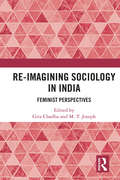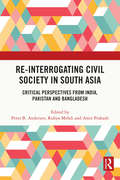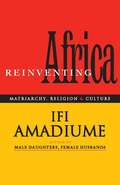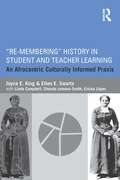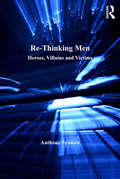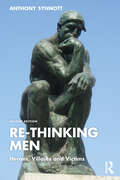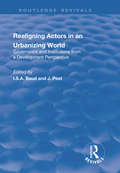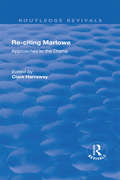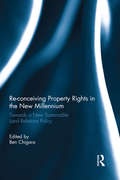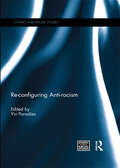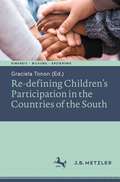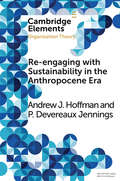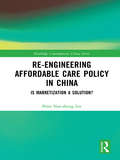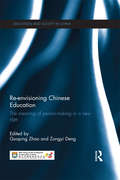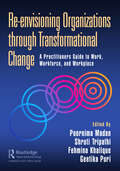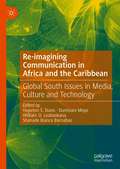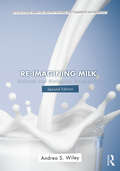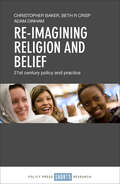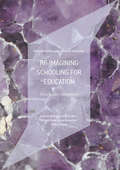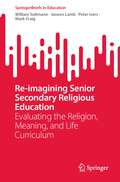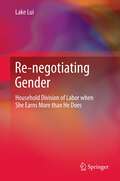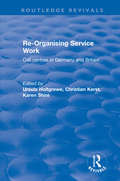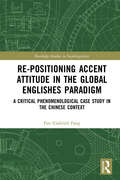- Table View
- List View
Re-Imagining Sociology in India: Feminist Perspectives
by Gita Chadha M. T. JosephThis book maps the intersections between sociology and feminism in the Indian context. It retrieves the lives and work of women pioneers of and in sociology, asking crucial questions of their feminisms and their sociologies. The chapters address the experiential realities of women in the field, pedagogical issues, methodological frameworks, mentoring processes and artistic engagements with academic work. The volume’s strength lies in bringing together Indian scholars from diverse social backgrounds and regions, reflecting on the specificity of the Indian social sciences. The chapters cover a range of key areas, including sexuality, law, environment, science and medicine. This volume will greatly interest students, teachers, researchers and practitioners of sociology, women’s studies, gender studies and feminism, politics and postcolonial studies.
Re-Interrogating Civil Society in South Asia: Critical Perspectives from India, Pakistan and Bangladesh
by Amit Prakash Rubya Mehdi Peter B. AndersenThis book offers an overview of the history and development of civil society in three major nations of South Asia – Pakistan, India and Bangladesh – from colonial times to the present. It examines the liberalization of civil society since the 1980s, the needs it created for civil action, the professionalization of civil society organizations, and the extent to which civil society may benefit society at large in the context of local, national and global transformations in the economy, political regime and ideology. The reader will find new insights on the interaction between the liberalization of multifaceted civil societies in the three countries, presenting contrasts such as restrictions put on women’s organizations or labour unions and acceptance of religious organizations’ activities. The volume looks at forms of transfer of civil society models, representation and democratic legitimacy of civil society organizations such as nongovernmental organizations, government organized NGOs and faith-based organizations, along with the structuring of civil society through legal frames as well as female, religious, and ethnic mobilizations around language and literature. Using wide-ranging empirical data and theoretical analyses, it deals with civil society issues relating to human rights and political challenges, justice, inequality, empowerment, and the role of bureaucracy, women’s movements, and ethnic and linguistic minorities. It also presents early responses to the Covid-19 crisis in 2020 which created significant pressure on the states and on civil society. This book will be useful to scholars and researchers of political studies, development studies, sociology, public policy and governance, law and human rights, as also to professionals in think tanks, civil society activists and NGOs.
Re-Inventing Africa: Matriarchy, Religion and Culture
by Ifi AmadiumeThis extraordinary book issues a clarion call for a new understanding of Africa. The author of the best-selling Male Daughters/Female Husbands here issues a challenge to western anthropologists to recognize their own complicity in producing a version of Africa that is often little more than a reflection of their own class-based, patriarchal thought. <P><P>Professor Amadiume calls instead for a new history of Africa, made and written by Africans. This is such a book.
Re-Membering History in Student and Teacher Learning: An Afrocentric Culturally Informed Praxis
by Joyce E. King Ellen E. SwartzWhat kind of social studies knowledge can stimulate a critical and ethical dialog with the past and present? "Re-Membering" History in Student and Teacher Learning answers this question by explaining and illustrating a process of historical recovery that merges Afrocentric theory and principles of culturally informed curricular practice to reconnect multiple knowledge bases and experiences. In the case studies presented, K-12 practitioners, teacher educators, preservice teachers, and parents use this praxis to produce and then study the use of democratized student texts; they step outside of reproducing standard school experiences to engage in conscious inquiry about their shared present as a continuance of a shared past. This volume exemplifies not only why instructional materials—including most so-called multicultural materials—obstruct democratized knowledge, but also takes the next step to construct and then study how "re-membered" student texts can be used. Case study findings reveal improved student outcomes, enhanced relationships between teachers and families and teachers and students, and a closer connection for children and adults to their heritage.
Re-Thinking Men: Heroes, Villains and Victims
by Anthony SynnottMuch writing on men in the field of gender studies tends to focus unduly, almost exclusively, on portraying men as villains and women as victims in a moral bi-polar paradigm. Re-Thinking Men reverses the proclivity which ignores not only the positive contributions of men to society, but also the male victims of life including the homeless, the incarcerated, the victims of homicide, suicide, accidents, war and the draft, and sexism, as well as those affected by the failures of the health, education, political and justice systems. Proceeding from a radically different perspective in seeking a more positive, balanced and inclusive view of men (and women), this book presents three contrasting paradigms of men as Heroes, Villains and Victims. With the development of a comparative and revised gender perspective drawing on US, Canadian and UK sources, this book will be of interest to scholars across a range of social sciences.
Re-Thinking Men: Heroes, Villains and Victims (Routledge Research in Gender and Society)
by Anthony SynnottMuch writing on men in the field of gender studies tends to focus unduly, almost exclusively, on portraying men as villains and women as victims in a moral bi-polar paradigm. Re-Thinking Men reverses the proclivity which ignores not only the positive contributions of men to society, but also the male victims of life including the homeless, the incarcerated, the victims of homicide, suicide, accidents, war and the draft, and sexism, as well as those affected by the failures of the health, education, political, and justice systems. Proceeding from a radically different perspective in seeking a more positive, balanced, and inclusive view of men (and women), this book presents three contrasting paradigms of men as heroes, villains, and victims. Revised and updated, and presenting data and studies from the United States, Canada, and the United Kingdom, it offers a comparative and revised perspective on gender that will be of interest to scholars across a range of social sciences.
Re-aligning Actors in an Urbanized World: Governance and Institutions from a Development Perspective (Routledge Revivals)
by I. Baud J. PostThis title was first published in 2003. In the 1980s, discussions on urban, regional and international development were dominated by those advocating liberalism and free markets. In the 1990s, the experiences of many countries from the previous Soviet Union and those following socialist development models in the South have led to a renewed interest in the democratic institutions that underpin economic development processes. Thus, the state has come back into focus as an "enabler", a co-ordinating agency working with a variety of other organizations in different forms of partnership aimed at urban and regional development. At the same time, increasing disparities between rich and poor have led poor urban households to organize collectively against poverty and to promote community and neighbourhood development. This title examines how both these processes take place, looking at patterns of fundamental re-aligning between state, civil society and the market in an integrated manner. It focuses on urban and regional development, because at the local and regional levels the direct interface between local government, the local and global market, and civil society organizations occurs. The question of re-alignment is considered from three main perspectives: governance and community organization issues at local level, urban areas as motors of economic development and their interface with globalization processes, and urban areas as the nodes of regional development. In each part of the book, one of these perspectives is taken. The contributions of the different authors are grouped around these complementary perspectives. Changing alignment patterns also have far-reaching implications. In the last section, the relation between research and policy around these issues is considered, based on reflections by policy makers and academics who have been influential both nationally and internationally.
Re-citing Marlowe: Approaches to the Drama (Routledge Revivals)
by Clare HarrawayThis title was first published in 2000: Re-citing the available information on Christopher Marlowe, this study seeks to illuminate the preoccupations and pitfalls of previous accounts of the dramatist's canon in an effort to discover, or to elaborate, new areas of investigation. Each chapter considers one of Marlowe's dramatic works in relation to a different critical approach or isue suggested by scholarship's prior treatment of the play. The book consequently operates on two levels: it is a review of a canon which has suffered theoretical neglect; and a blueprint for a more critically sophisticated approach to English literature.
Re-conceiving Property Rights in the New Millennium: Towards a New Sustainable Land Relations Policy
by Ben ChigaraThis book constitutes volume two of a two volume examination of development community land issues in Southern Africa. Following from volume one Southern African Development Community Land Issues, this book considers the possibility of a new, sustainable land relations policy for Southern African Development Community States (SADC) that are currently mired up in land disputes that have become subject of domestic, regional and international tribunals. Chigara demonstrates that land relations in the SADC have always been, and will perhaps remain, a matter for constitutional regulation. Because constitutional laws are distinctive from other laws only by constitutional design, legal contests appear to be the least likely means for settlement in the sub-region. Only human rights inspired policies, that respond to the call for social justice by acknowledging both the current and the underlying contexts to the disputes, hold the most potential to resolve these disputes. The book recommends efficient pedagogical counter-apartheid-rule psychological distortions regarding the significance of human dignity (PECAPDISH) as a pre-requisite and corollary to the dismantling of the salient physical legacy of apartheid-rule in affected SADC States. The book shows that PECAPDISH’s potential and benefits would be enormous. The book will be of interest to students and researchers of Property and Conveyancing Law, Human Rights Law, and Land Law.
Re-configuring Anti-racism (Ethnic and Racial Studies)
by Yin ParadiesIn our interconnected world of increasing racial, ethnic, and religious diversity, racism is an enduring phenomenon with a range of pernicious consequences for individuals, communities, and societies. Despite considerable scholarly attention to race and racism, there has been relatively little focus on anti-racism, defined as the theory and practice of addressing racism, counteracting its detrimental effects, or envisaging its possible alternatives. This edited collection explores the re-configuration of anti-racism in order to better combat racism in modern neo-liberal societies. Should anti-racism focus on tolerance, harmony, inclusion, equality, participation, recognition acknowledgement, indifference, and/or justice? What is the role of everyday race labour, the potentials and pitfalls of post-raciality, and the potential of alter-racism via humour, viscerality, embodiment, and affective atmospheres? The eight chapters forming this collection bring together scholars from cultural studies, geography, philosophy, political science, race relations, and sociology to debate key epistemologies, practices, and contradictions pertaining to anti-racism as a global endeavour. This book was originally published as a special issue of Ethnic and Racial Studies.
Re-defining Children’s Participation in the Countries of the South (Kindheit – Bildung – Erziehung. Philosophische Perspektiven)
by Graciela TononThe focus of this book is centered on the participation of children in countries of the South. In this sense, it will review the possibilities of children's participation, as well as their forms of participation in different contexts of daily life. There has been a tendency to underestimate children’s role as active constructors of their surrounding social space, as well as of the internalized interpretations of the way social life operates. Today it is necessary to recognize that children are agents actively involved in the construction of their own lives and the life of the societies they live in; and in this sense, it is important to consider and re-signify the participation of boys and girls as a fundamental pillar in the process of building societies in the 21st century. The book contains chapters that re-significate children’s participation in different countries from South America and South Africa, in relation with different topics: well-being, methods, citizenship, poverty, education, rurality, ethics and human rights.
Re-engaging with Sustainability in the Anthropocene Era: An Institutional Approach (Elements in Organization Theory)
by Andrew Hoffman P. Devereaux JenningsInstitutional Dynamics for Re-Engaging with Sustainability in the Anthropocene Era applies organization theory to a grand challenge: our entry into the Anthropocene era, a period marked not only by human impact on climate change, but on chemical waste, habitat destruction, and despeciation. It focuses on institutional theory, modified by political readings of organizations, as one approach that can help us navigate a new course. Besides offering mechanisms, such as institutional entrepreneurship, social movements, and policy shifts, the institutional-political variant developed here helps analysts understand the framing of scientific facts, the counter-mobilization of skeptics, and the creation of archetypes as new social orders.
Re-engineering Affordable Care Policy in China: Is Marketization a Solution? (Routledge Contemporary China Series)
by Peter Nan-shong LeePresenting a comprehensive examination of China’s medical care system, this book tackles issues of policymaking, organization, management and financing in the context of the provision of affordable care in China. Making use of extensive field investigations, interviews and a thorough analysis of documents, this book examines the re-structuring of the medical care system, spanning more than three and half decades from 1979 to the present day. Assessing the difficulties of regulatory control in the health care sector, it also explores theoretical alternatives, including post-Weberian constructs of uncertainty and control, as well as franchise and asymmetric information in market transactions. Ultimately, it argues that patient medical care has become less and less affordable amid shrinking government subsidies, breakdowns of public insurances and increases in user charges, especially between the mid-1990s and mid-2000s. Whilst the government took decades to re-organize the public hospital system and rebuild public insurances, it faced a dilemma of enforcing both low-cost medical care and maintaining revenue flow to public hospitals through marketization. Re-engineering Affordable Care Policy in China provides extensive discussion of the policymaking process as well as detailed analysis of policy contents. As such, it will be invaluable to students and scholars of Chinese social policy and public administration, as well as Chinese Studies more generally.
Re-envisioning Chinese Education: The meaning of person-making in a new age (Education and Society in China)
by Zongyi Deng Guoping ZhaoMaintaining education as a pedagogical space for human formation, this book is distinctive in looking at the crisis rather than the success of Chinese education. The editors and contributors, mostly overseas and mainland Chinese scholars, argue that modern Chinese education has been built upon a superficial and instrumental embrace of Western modernity and a fragmented appropriation of Chinese cultural heritage. They call for a rethinking and re-envisioning of Chinese education, grounded in and enriched by various cultural traditions and cross-cultural dialogues. Drawing on Chinese history and culture, Western and Chinese philosophies, curriculum and pedagogical theories, the collected volume analyzes (1) why education as person-making has failed to take root in contemporary China, (2) how the purpose of education has changed during the process of China’s modernization, and (3) what a rediscovery of the meaning of person-making implies for rethinking and re-envisioning Chinese education in the current age of globalization and social change. Re-envisioning Chinese Education: The meaning of person-making in a new age discusses among other issues: China’s Historical Encounter with the West and Modern Chinese Education Rediscover Lasting Values: Confucian Cultural Learning Models in the Twenty-first Century Rethinking and Re-envisioning Chinese Didactics: Implications from the German Didaktik Tradition The New Basic Education and the Development of Human Subjectivity: A Chinese Experience This book will be relevant for scholars, researchers, and policy makers everywhere who seek a more balanced, more sophisticated, and philosophically better grounded understanding of Chinese education.
Re-envisioning Organizations through Transformational Change: A Practitioners Guide to Work, Workforce, and Workplace
by Shruti Tripathi Poornima Madan Fehmina Khalique Geetika PuriThe journey towards the future of work was greatly accelerated due to the COVID pandemic. Some changes have altered the functioning of the business world forever. Against the backdrop of these alterations, variations, and modifications, this book presents and analyzes three crucial factors: work, workforce, and workplace and their transformation into new-age organizations for meeting its customer expectations and long-term strategic goals. Companies must focus on ways of deployment of policies and practices that meet the business needs from the perspective of external changes. To achieve this goal, the organizations must realign their stakeholders and indulge in critical thinking by looking deeply into factors responsible for bringing about this transformational change. Re-envisioning is the current critical need for organizations to thrive; they must incorporate best practices to beat the competition and add value to their existing HR processes. This book clearly presents the practices and policies of successful organizations through the contribution of industry leaders. This book helps you understand the dynamism of work, workforce, and workplace that exist in organizations (as well as the challenges these organizations face) and their impact on business practices. The authors cover these broad areas because of the need to diversify and promote organic inclusive growth. Essentially, re-envisioning our organizations is the new normal. Organizations must leave the shackles of what might have been and look to what they can be. Stakeholders, employees, and the environment have been drastically altered, and organizations must change accordingly to survive. What now matters is how much an organization re-envisions itself and how it deals with all that is happening.
Re-forming the Body: Religion, Community and Modernity (Published in association with Theory, Culture & Society #50)
by Professor Chris Shilling Philip A Mellor`Enriches the concpetual arsenal for interdisciplinary analysis of political, social and cultural change... stimulates more nuanced thinking about the cultural and political legacy of the Reformation era... manages both to clarify tensions surrounding cultural and social integration in the late 20th century while underscoring the real historical complexity of modern bodies' - American Journal of Sociology Through an analysis of successive re-formations of the body, this innovative and penetrating book constructs a fascinating and wide-ranging account of how the creation and evolution of different patterns of human community are intimately related to the somatic experience of the sacred. The book places the relationship between the embodiment and the sacred at the crux of social theory, and casts a fresh light on the emergence and transformation of modernity. It critically examines the thesis that the rational projects of modern embodiment have 'died and gone to cyberspace', and suggests that we are witnessing the rise of a virulent, effervescent form of the sacred which is changing how people 'see' and 'keep in touch' with the world around them.
Re-imagining Communication in Africa and the Caribbean: Global South Issues in Media, Culture and Technology
by Hopeton S. Dunn Dumisani Moyo William O. Lesitaokana Shanade Bianca BarnabasThis book advances alternative approaches to understanding media, culture and technology in two vibrant regions of the Global South. Bringing together scholars from Africa and the Caribbean, it traverses the domains of communication theory, digital technology strategy, media practice reforms, and corporate and cultural renewal. The first section tackles research and technology with new conceptual thinking from the South. The book then looks at emerging approaches to community digital networks, online diaspora entertainment, and video gaming strategies. The volume then explores reforms in policy and professional practice, including in broadcast television, online newspapers, media philanthropy, and business news reporting. Its final section examines the role of village-based folk media, the power of popular music in political opposition, and new approaches to overcoming neo-colonial propaganda and external corporate hegemony. This book therefore engages critically with the central issues of how we communicate, produce, entertain, and build communities in 21st-century Africa and the Caribbean.
Re-imagining Milk: Cultural and Biological Perspectives (Routledge Series for Creative Teaching and Learning in Anthropology)
by Andrea S. WileyMilk is a fascinating food: it is produced by mothers of each mammalian species for consumption by nursing infants of that species, yet many humans drink the milk of another species (mostly cows) and they drink it throughout life. Thus we might expect that this dietary practice has some effects on human biology that are different from other foods. In Re-imagining Milk Wiley considers these, but also puts milk-drinking into a broader historical and cross-cultural context. In particular, she asks how dietary policies promoting milk came into being in the U.S., how they intersect with biological variation in milk digestion, how milk consumption is related to child growth, and how milk is currently undergoing globalizing processes that contribute to its status as a normative food for children (using India and China as examples). Wiley challenges the reader to re-evaluate their assumptions about cows' milk as a food for humans. Informed by both biological and social theory and data, Re-imagining Milk provides a biocultural analysis of this complex food and illustrates how a focus on a single commodity can illuminate aspects of human biology and culture.
Re-imagining Religion and Belief: 21st Century Policy and Practice
by Christopher Baker Beth R. CrispThe need to reimagine religion and belief is precipitated by their greater visibility in public life. Meanwhile, social policy responses often see them from a problem-based, rather than an asset-based, approach. However, with growing diversity of religion and belief in every sector comes the potential for new dialogues across previously impermeable policy and disciplinary silos. This volume brings together leading international authors to critically consider these challenges within legal and policy frameworks, including security and cohesion, welfare, law, health and social care, inequality, cohesion, extremism, migration and abuse. It challenges policy makers to re-imagine religion and belief as an integral part of public life that contains resources, practices, forms of knowledge and experience that are essential to a coherent policy approach to diversity, enhanced democracy and participation.
Re-imagining Schooling for Education
by Kitty Te Riele Debra Hayes Glenda Mcgregor Martin Mills Aspa BaroutsisThis book provokes a conversation about what supportive schooling contexts for both students and teachers might look like, and considers how schooling can contribute to a more socially-just society. It takes as its starting point the position of the most marginalised students, many of whom have either been rejected by or have rejected mainstream schooling, and argues that the experiences of these students suggest that it is time for schools to be reimagined for all young people. Utilizing both theory and data, the volume critiques many of the issues in conventional schools that work against education, and presents evidence 'from the field' in the form of data from unconventional schooling sites, which demonstrates some of the structural, relational, curricular and pedagogical changes that appear to be enabling schooling for education for their students. It will be essential reading for students and researchers in the fields of education, sociology and social work, and will also be of great interest to practising teachers.
Re-imagining Senior Secondary Religious Education: Evaluating the Religion, Meaning, and Life Curriculum (SpringerBriefs in Education)
by Mark Craig William Sultmann Janeen Lamb Peter IversThis book examines and reports the findings regarding the level of satisfaction by students, teachers and parents with an innovative senior secondary Religious Education curriculum ‘Religion, Meaning and Life’ (RML). The stimulus for RML is found in the changing profile of students within faith-based schools and the motivation of school authorities to be inclusive and responsive to changing needs and priorities of students and families. Curriculum practices typically mirror this continuing renewal as community expectations give rise to innovation in curriculum practice. This concept of continuity and discontinuity is evidenced in the field of Religious Education,, which recognizes religious plurality while giving preference to an imagination centred on inclusion, hospitality and respectful dialogue. In this context, new pathways are being explored as the reality and significance of Religious Education in faith-based school remain a priority for Christian organizations in Australia.Mindful of the diversity of expectations within the Catholic school, the curriculum initiative of RML was developed, supported and implemented. The La Salle Academy of the Australian Catholic University reviewed this senior secondary curriculum across three years and presents in this book an independent, evaluative report of the findings, together with insights for implementation at scale and associated applications across Christian faith-based institutions.
Re-membering Culture: Erasure and Renewal in Hmong American Education
by Bic NgoThe untold stories of resilience in Hmong American educationRe-membering Culture is a deep exploration of the intricate dynamics of cultural memory and education, centering the experiences of Hmong American students and educators. Arguing that the school, as a product of coloniality, perpetuates the marginalization and erasure of non-Western epistemologies, author Bic Ngo sheds light on the subtle yet impactful process of structured forgetting within the American education system. This politics of forgetting, in turn, contributes to the fragmentation of Hmong cultural heritage, identity, and community. Based on a high school in an urban center with a considerable Hmong immigrant community, Ngo&’s work draws on extensive ethnographic research with Hmong American community leaders, school administrators, parents, teachers, staff, and high school students to understand how they navigate the terrain of Western pedagogy while attempting to retain and preserve Hmong knowledge systems. Exploring a range of school experiences, Ngo traverses students&’ challenges in balancing school with family life and the everyday cultural racism encountered in the classroom as well as grassroots efforts to preserve culture, including the establishment of a Hmong Cultural Club. Highlighting these experiences and voices, Ngo provides a nuanced understanding of the challenges Hmong Americans face within an assimilationist society while contesting the dominant anti-immigrant narratives of refugee suffering and poverty. Through these practices of (re)storytelling, resurgence, and refusal, she underscores the agency of the Hmong American community, illuminating how the critical consciousness fostered by re-membering serves as a powerful tool in confronting white hegemonic ideologies in education. Retail e-book files for this title are screen-reader friendly.
Re-negotiating Gender
by Lake LuiIn Chinese societies where both "money" and "gender" confer power, can a woman's economic success relative to her husband's bring about a more equal division of household labor? Lui's qualitative study of "status-reversed" Hong Kong families, wherein wives earn more than their husbands, examines how couples re-negotiate household labor in ways that perpetuate male dominance within the family even when the traditional gender expectation that "men rule outside, women rule inside" (nanzhuwai, nuzhunei) is challenged. Going beyond the dyadic negotiation of household labor, this important study also explores the role of "third parties," namely the couples' children and parents, who actively encourage couples to conform to traditional gender norms, thereby reproducing an unequal division of household labor. Based upon the experiences of families with stay-at-home dads, Lui further identifies a new mechanism of deconstructing gender, by which couples concertedly construct new norms of "work" and "gender" that they maintain through daily interactions to fit their atypical relative earnings. As a result, there are sparks of hope that both men and women can be liberated from a set of traditional social norms. Re-negotiating Gender: Household Division of Labor When She Earns More than He Does is essential reading in the fields of family and gender studies, sociology, psychology, and East Asian studies.
Re-organising Service Work: Call Centres in Germany and Britain
by Ursula Holtgrewe Karen A. Shire Christian KerstThis title was first published in 2002. Call centres are a type of service work that stand at the interface between corporations and consumers. They exemplify more general tendencies present within service work. They also have a particular public image - being associated in the public mind with low skilled and regimented work. This volume presents contributions from British and German management academics and industrial sociologists based on primary research on call centres in both countries. The contributions cover the genesis and development of call centres as a new form of organization, or indeed a new industry; the rationalization and control strategies of organizations that establish call centres; and the nature of service work and service interactions. The findings of this volume challenge the common public image of call centres and finds that call centre employment is in fact very diverse. So, for example, skilled advising and consulting services are often performed over the phone. Along with the sometimes skilled nature of call centre work, work organization and working conditions vary as well. The text also seeks to contrast the British and German experience of call centre work and employment. In Germany clerical work has traditionally been embedded in the specific traditions of co-operative industrial relations that define the German model. Call centres present a strategic challenge to this model, and the expansion of call centres has been at the forefront of changes aimed at making employment more flexible in Germany. This work offers a choice of country cases, which permit a comparison of service employment within both a liberal capitalist and a socially embedded economy.
Re-positioning Accent Attitude in the Global Englishes Paradigm: A Critical Phenomenological Case Study in the Chinese Context (Routledge Studies in Sociolinguistics)
by Fan (Gabriel) FangThis book revisits the issue of China English as a developing variety of English and scrutinises students’ and teachers’ attitudes towards their own and other English accents from the critical phenomenological perspective of Global Englishes (GE) in the Chinese context. The research contributes to the field of GE by proposing a model of pronunciation teaching called ToPIC (Teaching of Pronunciation for Intercultural Communication) informed by interculturally responsive language pedagogy. Combining theory and empirical data, the book presents ground-breaking research on accent attitudes in the Chinese context within the GE paradigm and raises issues and concerns regarding teaching English, particularly speaking and pronunciation, from the GE perspective. Unpacking attitudes towards English accents from a critical perspective, this book will both show policy makers the need to consider the impacts of GE and help practitioners and language learners re-evaluate the goals and needs of English learning. The ToPIC approach also has significance for curriculum reform as it readdresses various issues in language policy and practice. The ToPIC approach is recommended for those interested in teaching and learning English in the expanding circle context and those seeking to learn more about learning and using English across the world.
